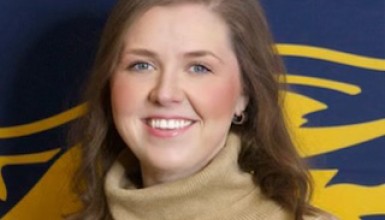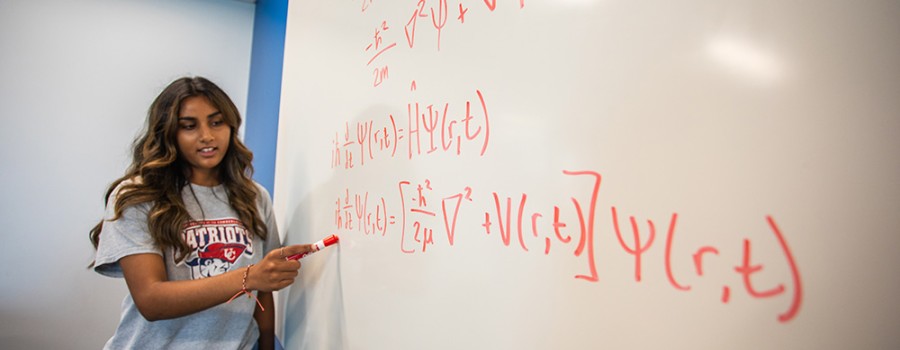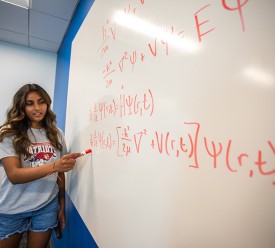Teach the language of the universe to young learners.
As a major in mathematics, you’ll be developing highly sought-after problem-solving skills to aid you in a variety of career opportunities. With a focus on secondary education, you’ll learn how to use creativity and communication to prepare students for future careers in science, technology, engineering, and mathematics (STEM).
Thanks to our small class sizes, you’ll receive one-on-one instruction from professors who are committed to helping you achieve your specific career goals. Classroom discussion will teach you how to think critically. Coursework will teach you how to learn. Combine all that with access to state-of-the-art technology, you’ll be well on your way to making a difference in your very own future classroom.
By the Numbers
Programs & Requirements
* The credit hours listed on this page only reference the specific program requirements and is not reflective of the total hours necessary to receive your degree. Cumberlands requires all students obtain a minimum of 60 hours for an associate’s degree and a total of 120 hours for a bachelor’s degree. Transfer and prior learning credits may be counted toward those totals.
To learn more about our General Education Requirements, please visit the page referenced below or explore our Academic Catalog.
Bachelor of Science in Mathematics Education (Secondary Certification)
Coursework for our accredited bachelor’s degree program in mathematics education is aimed at helping students gain a fundamental understanding of the math and science that govern our everyday modern lives. Throughout your mathematic studies at Cumberlands, you’ll take relevant physics and mathematics coursework—from calculus to differential equations to discrete mathematics and more. As an education student you’ll also gain comprehensive understanding of how to develop lessons, assess progress, personalize instruction, and more.
Course Requirements
Students pursuing the mathematics education major are also encouraged to take additional mathematics courses selected from the following:
42 semester hours in professional education - see the catalog listing for the School of Education for professional education requirements.
A Bachelor of Arts degree requires completing the same courses as a Bachelor of Science with the addition of completing one foreign language sequence through the intermediate level.
- FREN 131 Elementary French I
- FREN 132 Elementary French II
- FREN 231 Intermediate French I
- FREN 232 Intermediate French II
- SPAN 131 Elementary Spanish I
- SPAN 132 Elementary Spanish II
- SPAN 231 Intermediate Spanish I
- SPAN 232 Intermediate Spanish II
Take the Next Step
Mission & Goals
The purpose of the mathematics program is to develop a broad understanding of mathematics and an appreciation of its beauty and usefulness in the world. With a mathematics degree from Cumberlands, along with an emphasis in education, you will know how to:
Mathematics Education Careers & Outcomes
*All statistics from the U.S. Bureau of Labor and Statistics
Mathematics Teacher (9-12): $61,820
Mathematics Teacher (9-12): $61,820
With a degree in mathematics education, you will be fully equipped to pursue a career as a high school math teacher.
Natural Sciences Manager: $137,900
Natural Sciences Manager: $137,900
Your math background can also help you enter fields of scientific study, working in and/or managing laboratories and scientific studies.
Mathematician/Statistician: $96,280
Mathematician/Statistician: $96,280
From big business and global markets to local, state and federal government, employers in every industry prize the critical-thinking and problem-solving skills of mathematics students.
Data Scientist: $100,910
Data Scientist: $100,910
Maybe you have a love for the experimenting side of science as well as numbers and equations. As a date scientist you would use analytical tools and techniques to extract meaningful insights from data.
Management Analyst: $93,000
Management Analyst: $93,000
You may choose to use your mathematics degree working as a management analyst, recommending ways to improve an organization’s efficiency.
Postsecondary Instructor: $79,640
Postsecondary Instructor: $79,640
With a mathematics education degree, you may also pursue a career in postsecondary education, helping prepare future college students for careers in mathematics.
Common Questions
A mathematics education degree is a program designed to provide students with a deep understanding of mathematical concepts and the pedagogical skills needed to teach mathematics effectively. It prepares graduates to become proficient math teachers who can inspire and educate students at various educational levels.
A mathematics education degree typically takes four years to complete for a bachelor's degree. This includes general education courses, core mathematics courses, and education courses, along with student teaching experiences.
Yes, many universities offer mathematics education degrees online. These programs often combine online coursework with in-person teaching practicum requirements, allowing students to gain hands-on teaching experience in their local communities.
Absolutely, a mathematics education degree is worth it for those passionate about teaching and mathematics. It opens up various career opportunities in education, provides job stability, and offers the satisfaction of making a positive impact on students' lives.
With a mathematics education degree, you can pursue careers such as a high school math teacher, middle school math teacher, educational consultant, curriculum developer, or even further studies to become a postsecondary instructor. Additionally, your strong analytical skills can lead to roles in fields like data analysis, finance, and management.
To obtain a mathematics education degree, you need to enroll in a university that offers the program. Complete the required coursework, which includes mathematics and education classes, and participate in student teaching experiences. After earning your degree, you may need to pass state certification exams to become a licensed teacher.
A bachelor's degree in mathematics education is typically the best degree for aspiring math teachers. This program combines in-depth mathematical knowledge with teaching methodologies, preparing graduates for effective classroom instruction.
While not always required, having a degree in mathematics or mathematics education is highly beneficial for math teachers. It ensures they possess the necessary content knowledge and pedagogical skills to teach mathematics effectively.
A math teaching degree is commonly referred to as a Bachelor of Science in Mathematics Education or simply a Mathematics Education degree. This degree focuses on both mathematics and teaching methodologies.
Faculty Experts in Mathematics
Learn more about the mathematics professors you will interact with.

Jenine Leskiw

Rebekah Griffith
Rebekah Griffith
Contact Information

Susan Greer
Request Information
Learn more about all that Cumberlands has to offer.

